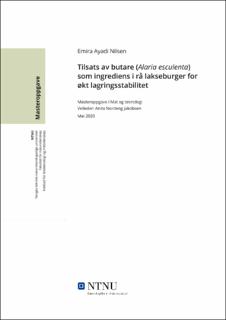| dc.description.abstract | Marine makroalger, spesielt brunalger, er kjent for å inneholde høye nivåer av polyfenoler med antioksidative og antimikrobielle egenskaper. Disse egenskapene kan utnyttes innen næringsmiddelindustrien som en ingrediens i matprodukter for å oppnå økt lagringsstabilitet. Målet med oppgaven var derfor å undersøke om tilsats av blansjert, frysetørket butare (Alaria esculenta) i pulverisert form kunne øke lagringsstabilitet i rå lakseburger (Salmo salar). For å finne optimale blansjeringsbetingelser for butare, ble kombinasjoner av temperatur (60, 70, 80 og 90 °) og tid (90, 180 og 900 sekunder) testet ut og optimaliseringen ble basert på kvantifisering av polyfenol- og antioksidantnivå med henholdsvis Folin- Ciocalteu metoden og DPPH- radical scavenging assay. Blansjering ble utført i vann og råstoffet var vakuum-pakket under varmebehandlingen. Enzyminaktivering i butare blansjert ved ulike betingelser ble også testet ved katalase- og peroksidasetest. Blansjeringsstudiet ga ingen indikasjon på hvilken blansjeringstemperatur og -holdetid som ga best utbytte av polyfenoler og antioksidativ kapasitet samt enzyminaktivering i butare. I midlertidig viste resultatene at både temperatur og holdetid påvirker antioksidativ kapasitet i butare. Den sterkeste blansjeringsbetingelse, 90 °C i 180 sekunder, ble valgt som optimal for å sikre fullstendig inaktivering av enzymer i butare. Deretter ble lakseburgerne produsert ved kverning av filet og avskjær fra atlantisk laks og tilsatt pulverisert butare, forbehandlet ved dehydrering og blansjering (90 °C i 180 sekunder), i konsentrasjoner 0 (kontroll), 0,41, 1,66 og 2,91 %. Lakseburgerne ble pakket i modifisert atmosfære (CO2:N2, 60 %:40 %) og kjølelagret i 4 °C, over 21 dager. Lagringsstabilitet til lakseburgerne ble analysert ved å måle oppvekst av totalt psykotroft kimtall (TPK), Pseudomonas spp., melkesyrebakterier (LAB) og Brochotrix thermosphacta (B. thermosphacta). Det ble påvist oppvekst av TPK, Pseudomonas spp. og LAB i lakseburgerne med og uten tilsats av pulverisert butare. Lagringsforsøket viste ikke økt stabilitet da lakseburger tilsatt butare ikke viste antimikrobiell effekt mot TPK og LAB. Resultatene indikerte derimot antimikrobiell effekt mot Pseudomonas spp. i lakseburgere tilsatt 1,66 og 2,33 % butare, men nivået var lavt. Den hemmende effekten ved tilsats av alge kan ha vært forårsaket av andre faktorer enn antimikrobiell effekt, som saltinnhold i butare eller redusert vannaktivitet grunnet rehydrering av vann fra laksefarse til algen. Videre ble det funnet lave verdier av polyfenoler og antioksidativ kapasitet, sammenlignet med andre studier. Det lave nivået kan ha bidratt til liten antimikrobiell effekt i lakseburgerne og videre arbeid rettet mot inkorporering av butare som et middel for å stabilisere matprodukter er derfor anbefalt. | |
| dc.description.abstract | Marine macroalgae, especially brown algae, are known to contain high levels of polyphenols with antioxidant and antimicrobial properties. These properties can be utilized in the food industry as an ingredient to increase stability of food products. Therefore, the aim of this thesis was to investigate whether the addition of blanched, freeze-dried Alaria esculenta, in a powdered form, could increase storage stability in raw salmon burgers (Salmo salar). To find optimal blanching conditions for Alaria esculenta, combinations of temperature (60, 70, 80 and 90 °) and time (90, 180 and 900 seconds) were tested and optimization was based on the quantification of polyphenol and antioxidant levels by the Folin-Ciocalteu method and DPPH radical scavenging assay, respectively. Alaria esculenta was vacuum-packed, when blanched with water. Enzyme inactivation in Alaria esculenta, blanched under various conditions, was also tested by catalase- and peroxidase assays. The blanching study gave no indication of which combination of blanching temperature and holding time, that gave the best yield of polyphenols and antioxidant capacity, as well as enzyme inactivation in Alaria esculenta. The results achieved did however indicate that both temperature and holding time affects the yield of antioxidant capasity. The strongest blanching condition, 90 ° C for 180 seconds, was chosen as optimal, to ensure complete inactivation of enzymes in the algae. Salmon burgers were produced by grinding the fillets and trimmings from Atlantic salmon and adding powdered Alaria esculenta, pre-treated by dehydration and blanching (90 ° C for 180 seconds), at concentrations of 0 (control), 0.41, 1.166 and 2.99 %. The salmon burgers were packed in modified atmosphere (CO2: N2, 60%: 40%) and refrigerated at 4 ° C, over 21 days. Storage stability of salmon burgers were analyzed by measuring the growth of total psychotrophic plate count (TPK), Pseudomonas spp., Lactic acid bacteria (LAB) and Brochotrix thermosphacta (B. thermosphacta). The growth of TPK, Pseudomonas spp. and LAB was detected in salmon burgers, with and without the addition of powdered Alaria esculenta. The storage experiment did however not give an increased stability, as the salmon burgers with the addition of powdered algae did not show antimicrobial effect against TPK and LAB. On the other hand, the results, indicated antimicrobial efficacy against Pseudomonas spp. in salmon burgers added 1.66 and 2.33% butare, but the growth levels were low. The inhibitory effect of the addition of Alaria esculenta may have been caused by factors other than the antimicrobial effect, such as salt content of the algae or reduced water activity due to rehydration of the algae. Furthermore, low values of polyphenols and antioxidant capacity were found in Alaria esculenta, compared to other studies. The low level may have contributed to low antimicrobial effect in the salmon burgers and further work aimed at incorporating Alaria esculenta as an agent to stabilize food products is therefore recommended. | |
